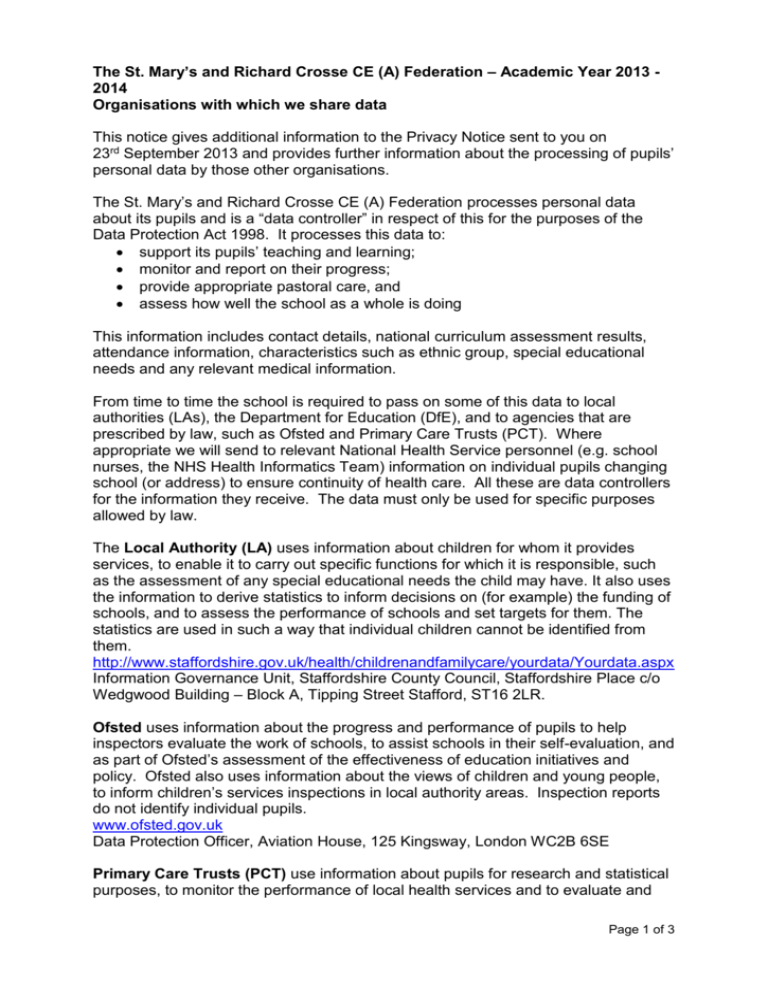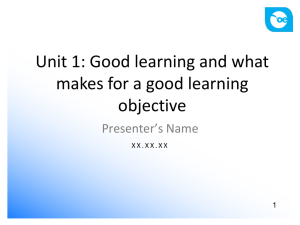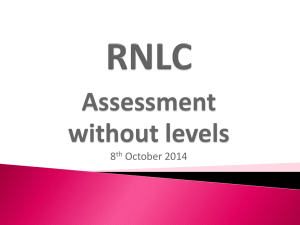Privacy Notice - St. Mary`s C.E.(VA) Primary School, Colton
advertisement

The St. Mary’s and Richard Crosse CE (A) Federation – Academic Year 2013 2014 Organisations with which we share data This notice gives additional information to the Privacy Notice sent to you on 23rd September 2013 and provides further information about the processing of pupils’ personal data by those other organisations. The St. Mary’s and Richard Crosse CE (A) Federation processes personal data about its pupils and is a “data controller” in respect of this for the purposes of the Data Protection Act 1998. It processes this data to: support its pupils’ teaching and learning; monitor and report on their progress; provide appropriate pastoral care, and assess how well the school as a whole is doing This information includes contact details, national curriculum assessment results, attendance information, characteristics such as ethnic group, special educational needs and any relevant medical information. From time to time the school is required to pass on some of this data to local authorities (LAs), the Department for Education (DfE), and to agencies that are prescribed by law, such as Ofsted and Primary Care Trusts (PCT). Where appropriate we will send to relevant National Health Service personnel (e.g. school nurses, the NHS Health Informatics Team) information on individual pupils changing school (or address) to ensure continuity of health care. All these are data controllers for the information they receive. The data must only be used for specific purposes allowed by law. The Local Authority (LA) uses information about children for whom it provides services, to enable it to carry out specific functions for which it is responsible, such as the assessment of any special educational needs the child may have. It also uses the information to derive statistics to inform decisions on (for example) the funding of schools, and to assess the performance of schools and set targets for them. The statistics are used in such a way that individual children cannot be identified from them. http://www.staffordshire.gov.uk/health/childrenandfamilycare/yourdata/Yourdata.aspx Information Governance Unit, Staffordshire County Council, Staffordshire Place c/o Wedgwood Building – Block A, Tipping Street Stafford, ST16 2LR. Ofsted uses information about the progress and performance of pupils to help inspectors evaluate the work of schools, to assist schools in their self-evaluation, and as part of Ofsted’s assessment of the effectiveness of education initiatives and policy. Ofsted also uses information about the views of children and young people, to inform children’s services inspections in local authority areas. Inspection reports do not identify individual pupils. www.ofsted.gov.uk Data Protection Officer, Aviation House, 125 Kingsway, London WC2B 6SE Primary Care Trusts (PCT) use information about pupils for research and statistical purposes, to monitor the performance of local health services and to evaluate and Page 1 of 3 develop them. The statistics are used in such a way that individual pupils cannot be identified from them. Information on the height and weight of individual pupils may however be provided to the child and its parents and this will require the PCTs to maintain details of pupils’ names for this purpose for a period designated by the Department of Health following the weighing and measuring process. PCTs may also provide individual schools and LAs with aggregate information on pupils’ height and weight. http://www.southstaffordshirepct.nhs.uk/contact/contact.asp http://www.northstaffordshire.nhs.uk/contact-us/?nhsns=782305839f20d7e436cd8a163992023b Youth Support Services - For pupils aged 13 years and over, the school is legally required to pass on certain information to the provider of Youth Support services in their area. This is the local authority support service for young people aged 13 to 19 in England. The school must provide the name and address of the pupil and their parents and any further information relevant to the support services' role. In addition, the date of birth of the pupil is supplied. Until pupils are aged 16 or older, their parent(s) can ask that no information beyond their children’s name, address and date of birth (and their own name and address) be passed to the youth support services provider. This right transfers to the pupil on their 16th birthday. Pupils and/or parents will need to inform the school if this is what they wish. Online information, advice and support on a range of issues affecting young people can be found on the Directgov Young People page at: www.direct.gov.uk/en/YoungPeople/index.htm with access to trained helpline advisers, via SMS text message, telephone, webchat and email. The Department for Education (DfE) uses information about pupils for research and statistical purposes, to inform, influence and improve education policy and to monitor the performance of the education service as a whole. The DfE will feed back to LAs and schools information about their pupils for a variety of purposes that will include data checking exercises, use in self-evaluation analyses and where information is missing because it was not passed on by a former school. The DfE will also provide Ofsted with pupil data for use in school inspection. Where relevant, pupil information may also be shared with post 16 learning institutions to minimise the administrative burden on application for a course and to aid the preparation of learning plans. Pupil information may be matched with other data sources that the Department holds in order to model and monitor pupils’ educational progression; and to provide comprehensive information back to LAs and learning institutions to support their day to day business. The DfE may also use contact details from these sources to obtain samples for statistical surveys: these surveys may be carried out by research agencies working under contract to the Department and participation in such surveys is usually voluntary. The Department may also match data from these sources to data obtained from statistical surveys. Pupil data may also be shared with other Government Departments and Agencies (including the Office for National Statistics) for statistical or research purposes only. In all these cases the matching will require that individualised data is used in the Page 2 of 3 processing operation, but that data will not be processed in such a way that it supports measures or decisions relating to particular individuals or identifies individuals in any results. This data sharing will be approved and controlled by the Department’s Chief Statistician. The DfE may also disclose individual pupil information to independent researchers into the educational achievements of pupils who have a legitimate need for it for their research, but each case will be determined on its merits and subject to the approval of the Department’s Chief Statistician. http://www.education.gov.uk/ Data Protection Officer, DfE, Sanctuary Buildings, Great Smith Street, London, SW1P 3BT info@education.gsi.gov.uk Pupils, as data subjects, have certain rights under the Data Protection Act, including a general right of access to personal data held on them, with parents exercising this right on their behalf if they are too young to do so themselves. If you wish to access the personal data held about you / your child, then please contact the relevant organisation in writing. Page 3 of 3

![afl_mat[1]](http://s2.studylib.net/store/data/005387843_1-8371eaaba182de7da429cb4369cd28fc-300x300.png)




